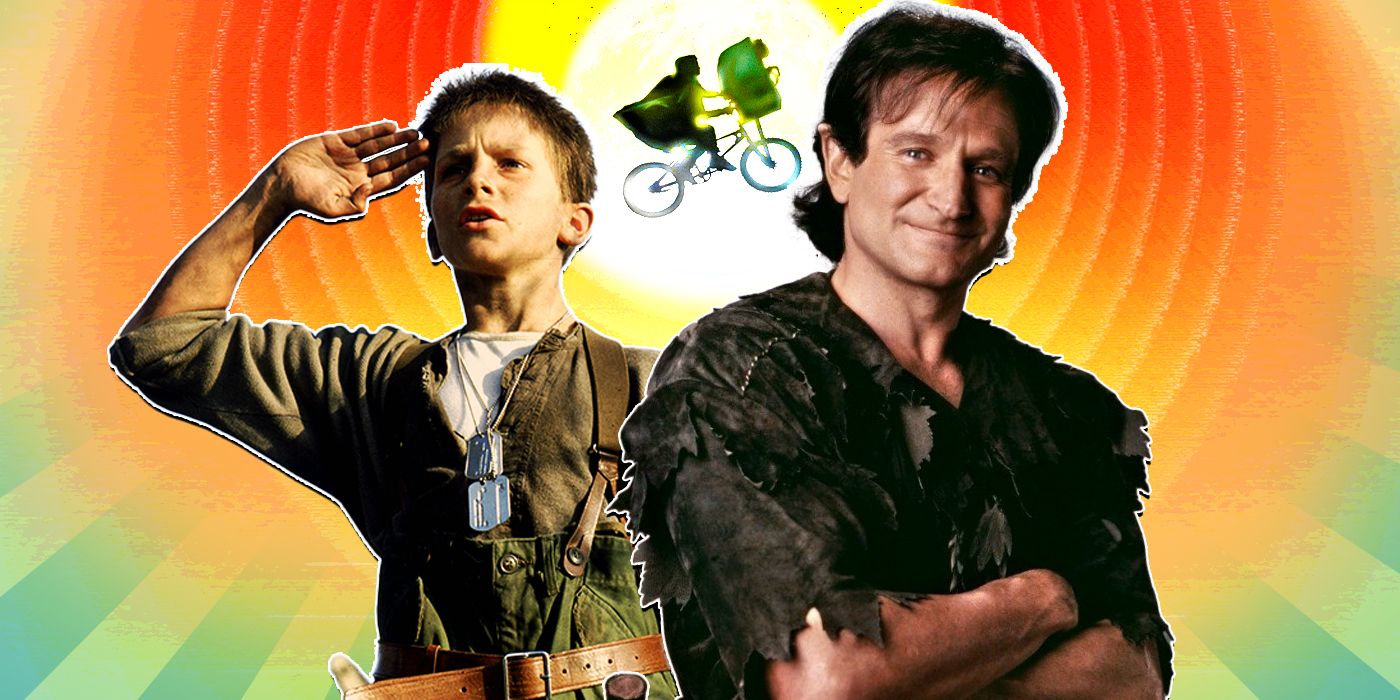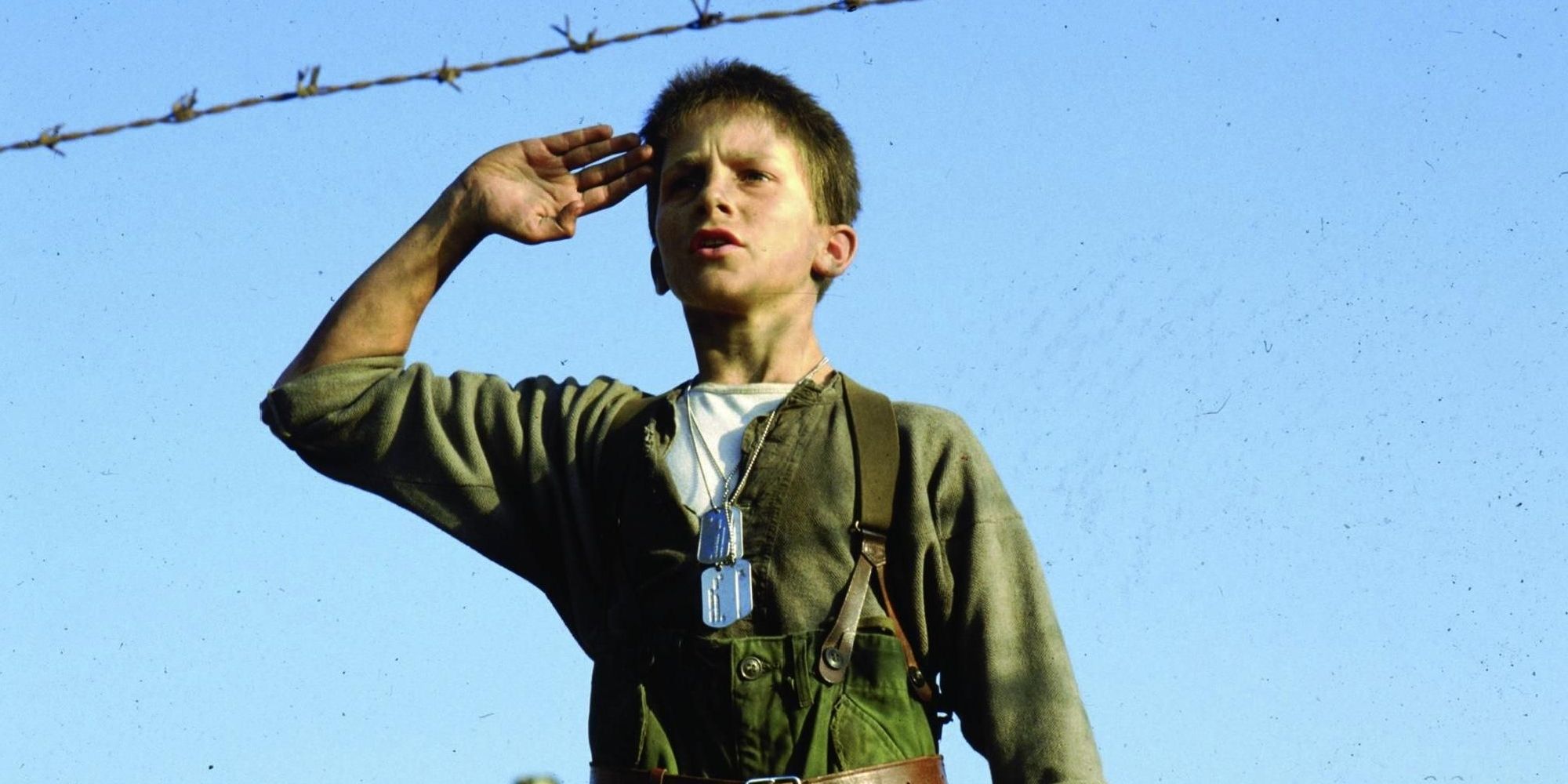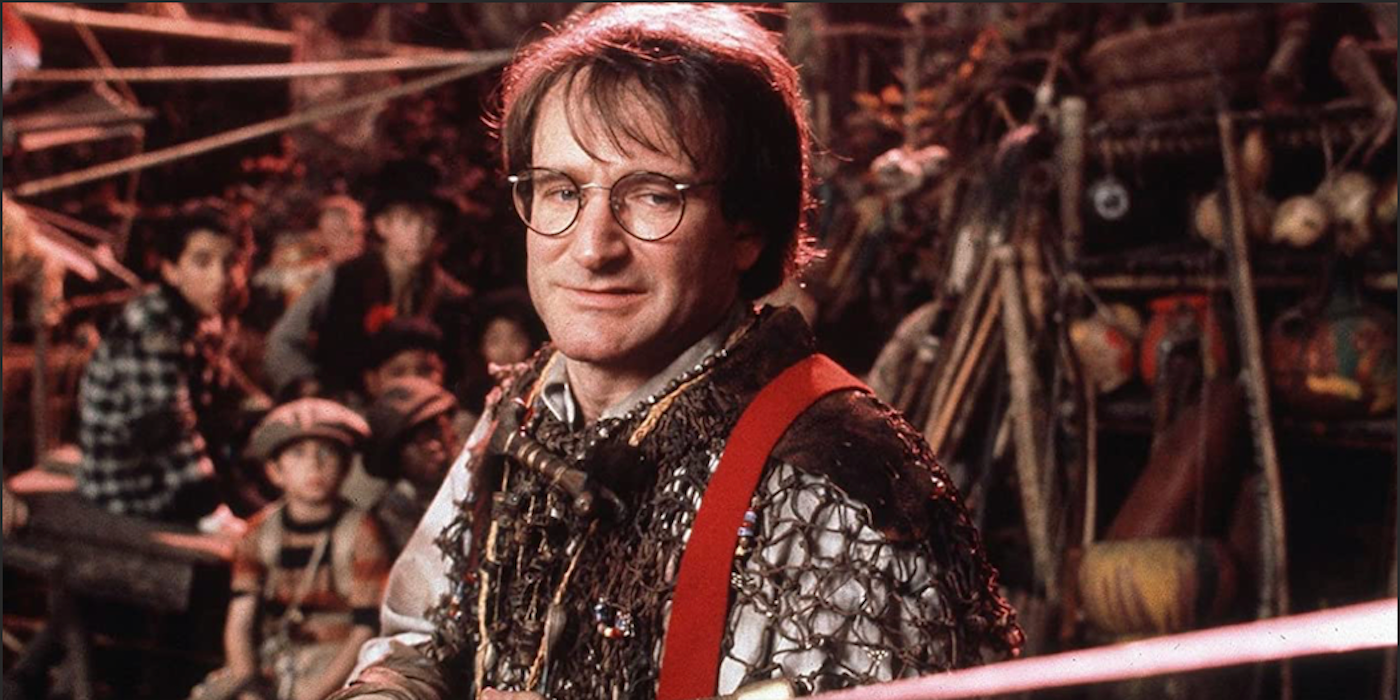Some filmmakers make their distinctive artistic voices known through narrative themes and motifs that stand out among even the most prolific bodies of work. No exception to this tendency is the world's most recognizable filmmaker, Steven Spielberg. With a career spanning nearly half a century, comprised of 33 films, there's very little this cinematic legend hasn't tried his hand at or put a stamp on, all the while making use of and exploring a handful of particular narrative undertones. Among the most notable recurring motifs in his filmography is the exploration of childhood and adolescent experiences, and how either embracing or transcending those formative years informs the overall journey of an individual.
While his earlier years as a filmmaker often depicted this dynamic as a largely positive motivator among the characters in his films, Spielberg's creative evolution eventually began to see a less sentimental approach to the motif in pursuit of some more grim and reality-based takes regarding the ways in which people react to the struggles that confront and shape them as youngsters. In anticipation of The Fabelmans, which is looking to be Spielberg's most directly personal and perhaps most reverential meditation on the nature of navigating childhood and adolescence, here's a look back at some of the filmmaker's most poignant and varied depictions of youthful experiences.
Elliott, Michael, and Gertie in 'E.T. The Extra-Terrestrial'
Spielberg's 1982 fantasy film, E.T., is his magnum opus relating to the wondrous and imaginative nature of being a youngster. In aiding an alien stranded on Earth, the sibling trio of Elliott (Henry Thomas), Michael (Robert MacNaughton), and Gertie (Drew Barrymore) represents the ultimate embrace of childhood and blissful naïveté. While initially and briefly recoiling in fear of the otherworldly creature, they almost immediately brush past their hesitant concerns of the unknown. The children further avoid bringing any sort of preconceived prejudices to the situation, instead reacting with hearts full of curiosity, empathy, and compassion. Much unlike many of Spielberg's other films that place an emphasis on the experience of being a child, E.T. is his most optimistic in its reveling in innocence.
For much of the film, excluding the sibling trio's mother, Spielberg frames the adult characters either in silhouette or from the waist and mid-chest down. This is an effective composition tactic in making them anonymous and occasionally giving viewers the literal perspective of children, for whom towering authoritative figures can be quite frightening when the world itself seems so outlandishly large. As opposed to the film's adults, who mostly view E.T. as a celestial discovery that warrants investigation, the children don't spend much time considering the larger implications of the alien's presence on Earth, opting to foster and develop a genuine friendship. It's this inherent sense of youthful innocence exhibited by Elliott, Michael, and Gertie that enables them to see beyond the bureaucratic nature of the scientific whirlwind that will eventually befall them. The incorruptible spirit of the film's young characters is at the core of what E.T. is about, illustrating the idea that children embody a purity that allows them to see the world much differently than their jaded and cynical adult counterparts.
Jim Graham in 'Empire of the Sun'
Empire of the Sun saw Spielberg in relatively rare form as the filmmaker began to consciously veer from the more escapist and sentimental material he'd been previously known for, and instead pursued subject matter that reflected some of the more bitter and tragic elements of the human condition. In stark contrast to the children of E.T. and their experience is that of Jim (Christian Bale) in the 1987 film. Based on J.G. Ballard's semi-autobiographical novel, the story focuses on a young English boy who is separated from his parents amidst the Japanese occupation of China during World War II. Jim is displaced from a privileged life and thrust into one of desperation in a matter of days. He eventually gets captured by Japanese troops and placed in an internment camp.
Early in the film, Jim is as naive and childlike as they come, often daydreaming and fantasizing about all things related to aviation. Spielberg once again gives viewers the sometimes literal perspective of a child, with a particular focus on Jim's obsession with airplanes and the romanticization of pilots. Once he's wrapped up in the chaos of war, however, he gradually abandons the blissful tendencies of youth as a means of self-preservation, ultimately learning to fend for himself and do what's necessary to survive under difficult circumstances. This is evident in the ways he allies himself with people who can benefit and protect him while interred in the Japanese camp. Jim's resourcefulness makes him a valuable asset to the adult prisoners, and he's able to convert those qualities into survival tactics.
Once the Japanese surrender to the Allies, Jim is reunited with his parents, although he is now is a far cry from the son they lost years before. Unlike the portrayal of childhood innocence in E.T., Empire of the Sun depicts a child who undergoes a spiritual transformation and loses that innocence as a result of external forces. This is a boy who had to grow up fast, as Spielberg stated, "This story is probably quintessentially more about the death of childhood than anything I've made before or after."
Peter Banning in 'Hook'
Antithetical to Jim's experience is Peter's (Robin Williams) in Hook. Even though Peter is an adult, the idea of framing youth and innocence as lost qualities worthy of rediscovery is at the heart of the 1991 film. Having grown up and forgotten his childhood experiences as the iconic Peter Pan in Neverland, Peter has become a workaholic lawyer and has lost touch with his children. It's only when they are kidnapped by the vengeful Captain Hook (Dustin Hoffman) that the distant father is forced to spring into action, rediscovering his dormant childlike spirit as a means of rescuing young Jack and Maggie.
While Hook is one of Spielberg's lesser-appreciated efforts, it's nonetheless an important chapter in the filmmaker's long list of titles exploring the nature of youth. The repression and subsequent recapturing of Peter's memories are central to what the film hinges on, turning the story of Peter Pan on its head and giving audiences a revisionist take on classic material. Speculative though it may be, one can't help but wonder about whether the dilemma facing the adult Peter had particular resonance with Spielberg. As one of the most prolific filmmakers in the world, it's not unreasonable to assume that as a very busy man navigating the cutthroat world of show business, he may have had concerns similar to those of Peter regarding a preoccupation with work and losing touch with his inner child at some point.
Frank Abagnale Jr. in 'Catch Me If You Can'
Based on the true story of a young man who defrauded millions of dollars by posing as a pilot, doctor, and lawyer throughout the 1960s, Catch Me If You Can is one of Spielberg's most fun and breezy outings. As an adolescent whose parents separate (another recurring element in Spielberg's work), Frank's (Leonardo DiCaprio) fight-or-flight response kicks in, and after choosing the latter he embarks on a globetrotting adventure in response to inner turmoil. Though light and entertaining, the film is simultaneously imbued with a sense of melancholy and sorrow in its depiction of the loss of a cohesive family unit. The young Frank, in a recurring sense of optimism, thinks that he can repair his parents' broken marriage and get them back together, holding on to a misplaced sense of wishful thinking for much of the film.
Aside from this aspect of his journey, part of what makes Frank's adventure utterly watchable is his ability to manipulate the adults surrounding him. A precocious youngster using irresistible charm as the ultimate currency, he's able to convince people that he is who and what he claims to be. Considering that mimicking adult behavior is a common tendency among children and adolescents, Frank is no exception and excels at deceiving a hefty number of people over the course of several years. Perhaps his most impressive ruse is when he confronts Tom Hanks' FBI Agent Carl Hanratty and, in a quick and brilliant bit of improvisation, convinces his elder that he is in fact an agent himself.
In this respect, Catch Me If You Can sees Spielberg approaching adolescence and maturation in a way that allows him to have his proverbial cake and eat it, too. By pretending to be someone he's not, Frank treats viewers to a series of moments that see him effortlessly transcending his youthful interior by fabricating and projecting a more sophisticated exterior. At the same time, however, his adult veil occasionally slips at the drop of a hat, and we're suddenly reminded of just how young he really is. Like Jim in Empire of the Sun, the con man finds himself living under circumstances in which he must both subdue his youthful tendencies and display the sort of behavior required to maintain self-preservation in an adult world.
David in 'A.I. Artificial Intelligence'
2001's A.I. Artificial Intelligence. once again found the iconic filmmaker visiting narrative territory through the eyes of a child. David (Haley Joel Osment), an uncannily lifelike robot who yearns to be a real boy, embarks on a journey that blends some of the world's more harsh realities with whimsical fairytale sensibilities. David hopes to achieve sentience amid a grim future society where robots are treated as second-class citizens, and in constant danger of being apprehended and destroyed by their human counterparts. A.I. sees Spielberg's recurring motif at its most bleak, with the young David learning hard lessons about humanity and, like Jim and Frank, having to transcend the wide-eye innocence of youth in favor of self-reliance and survival.
Central to the film and serving as David's motivation to become a real boy is a timeless notion: a child's love for his mother. After their emotional separation, David sets off in search of the blue fairy so that he can become a real boy. While the harrowing mid-portion of the film takes David to some of the world's darkest places and forces him to rely on his accruing knowledge of the human condition, it's the bookends before and after that give the film its beating heart. Essentially a love story between David and Monica (Frances O'Connor), A.I. treats viewers to an unabashed depiction of the tender dynamic between a mother and son in all its simplicity. Perhaps most effective is the film's conclusion, which sees a brief but wonderfully sentimental reunion between the two characters. After David is offered the opportunity to spend one final day with his mother, he and Monica share a series of lighthearted and playful moments before settling in for the evening and, presumably, dying. It's one of the most bittersweet conclusions of any film in recent memory. David may have been down a surreal rabbit hole of struggle and hardship for much of the film, but is ultimately rewarded for his efforts in seeking the love of his mother.
Each of these protagonists offers a unique perspective on the filmmaker's recurring motif of exploring youthful experiences and how they affect people individually. As a filmmaker who has always maintained a sense of innocence and optimistic exuberance even among some of his more dramatic and mature efforts, Spielberg has been able to approach the experiences of his younger characters from a variety of angles and enrich viewers' understanding of those formative years as a result. With his semi-autobiographical film just around the corner, one can't help but wonder if The Fabelmans will position itself as his seminal work regarding the bittersweet nature of growing up.


.jpg)


.jpg)
.jpg)